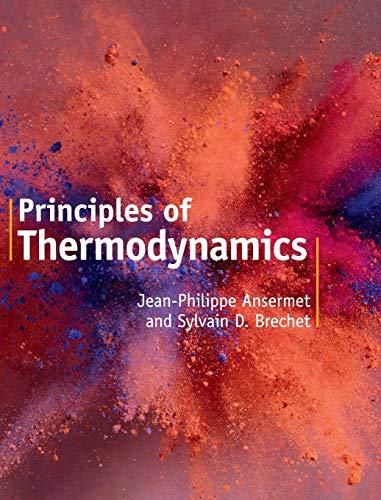A biological medium consists of two substances 1 and 2 of densities n 1 and n 2
Question:
A biological medium consists of two substances 1 and 2 of densities n1 and n2. This medium is generating both substances by processes characterised by the matter source densities π1 (n1, n2) and π2 (n1, n2). The substances 1 and 2 can diffuse inside this medium. The matter current densities j1 and j2 follow Fick’s law (11.51),![]() where D1 > 0 and D2 > 0 are the homogeneous diffusion constants of substances 1 and 2. The medium has a fixed volume, which means that its expansion rate vanishes, i.e. ∇· v = 0. Thus, the matter continuity equations for substances 1 and 2 are given by,
where D1 > 0 and D2 > 0 are the homogeneous diffusion constants of substances 1 and 2. The medium has a fixed volume, which means that its expansion rate vanishes, i.e. ∇· v = 0. Thus, the matter continuity equations for substances 1 and 2 are given by,![]() At equilibrium, the system is assumed to be homogeneous and characterised by the densities n01 and n02 of substances 1 and 2. In the neighbourhood of the equilibrium, the matter source densities π1 (n1, n2) and π2 (n1, n2) are given to first-order in terms of the density perturbations Δn1 = n1 − n01 and Δn2 = n2 − n02 by,
At equilibrium, the system is assumed to be homogeneous and characterised by the densities n01 and n02 of substances 1 and 2. In the neighbourhood of the equilibrium, the matter source densities π1 (n1, n2) and π2 (n1, n2) are given to first-order in terms of the density perturbations Δn1 = n1 − n01 and Δn2 = n2 − n02 by, where the coefficients Ω11, Ω12, Ω21, Ω22 are given by,
where the coefficients Ω11, Ω12, Ω21, Ω22 are given by, Assume that the processes to generate substances 1 and 2 are the two chemical reactions 1
Assume that the processes to generate substances 1 and 2 are the two chemical reactions 1 ![]() 2 and 2
2 and 2![]() 1 described by the stoichiometric coefficients νa1 = −1, νa2 = 1, νb1 = 1, νb2 = −1 and the reaction rate densities ωa and ωb. Assume that the temperature T and the chemical potentials μ1 and μ2 are homogeneous, i.e. ∇T = 0 and ∇μ1 = ∇μ2 = 0. Analyse the evolution of the density perturbations Δn1 and Δn2 by using the following instructions:
1 described by the stoichiometric coefficients νa1 = −1, νa2 = 1, νb1 = 1, νb2 = −1 and the reaction rate densities ωa and ωb. Assume that the temperature T and the chemical potentials μ1 and μ2 are homogeneous, i.e. ∇T = 0 and ∇μ1 = ∇μ2 = 0. Analyse the evolution of the density perturbations Δn1 and Δn2 by using the following instructions:
a) Express the coefficients Ω11, Ω12, Ω21, Ω22 in terms of the total density n = n1 + n2, the density perturbations Δn1 and Δn2, the temperature T and a scalar W ≥ 0, which is a linear combination of Onsager matrix elements Laa, Lab, Lba and Lbb. Begin by using the second law, i.e. πs ≥ 0, and the relation (8.68) for a mixture of ideal gas.
b) Determine the coupled time evolution equations for the density perturbations Δn1 and Δn2.c) Show that under the condition imposed in a) the relation, is a solution of the coupled time evolution equations with λ
is a solution of the coupled time evolution equations with λ
Step by Step Answer:

Principles Of Thermodynamics
ISBN: 9781108426091
1st Edition
Authors: Jean-Philippe Ansermet, Sylvain D. Brechet





